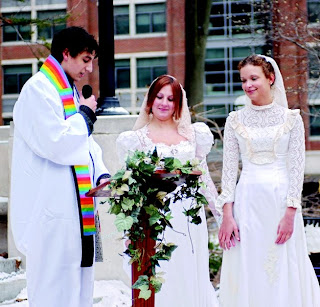Tomorrow, March 12, 2013, the Vatican II sect shall begins its false conclave to elect the next antipope. Many people wonder when a real conclave can or will occur. Will Christ Himself end this period of sedevacante since at least 1964? Are the so-called
sedeprivationists (i.e., those who hold to the theory which states that an antipope-heretic is still a "material" pope who can only appoint cardinals, but becomes a "formal" and true pope should he abjure the heresies of Vatican II, embrace the One True Faith, and get validly consecrated as bishop in the Traditional Rite if needed) to be proved correct if the next antipope converts? Many people begin to have doubts about sedevacantism because of the length of time we have been without a pope.
Do not be deceived by the length of time the Chair of Peter has been empty. It's not crazy to think the Church could be without a pope for so long; it is insanity to expect anything but another heretic to emerge from this conclave. I will now quote from theologian, Fr. Edmund James O'Reilly, as revised and edited by Mr. John Lane in 1999:
"In 1882 a book was published in England called
The Relations of the Church
to Society - Theological Essays, comprising twenty-nine essays by Fr. Edmund
James O'Reilly S.J., one of the leading theologians of his time. The book
expresses with wonderful clarity and succinctness many important theological
truths and insights on subjects indirectly as well as directly related to its
main theme.
For our purposes the book has in one respect an even greater
relevance than it did at the time of publication, for in it Fr. O'Reilly asserts
with the full weight of such authority as he possesses, the following
opinions:
- that a vacancy of the Holy See lasting for an extended period of time cannot
be pronounced to be incompatible with the promises of Christ as to the
indefectibility of the Church; and
- that it would be exceedingly rash to set any prejudged limits as to what God
will be prepared to allow to happen to the Holy See (other, of course, than that
a true pope will never fall into heresy, nor in any way
err).
Of course Fr. O'Reilly does not have the status of pope
or Doctor of the Church; but, that said, he was certainly no negligible
authority. Some idea of the esteem in which he was held can be obtained from the
following facts:
Cardinal Cullen, then Bishop of Armagh, chose him as his
theologian at the Synod of Thurles in 1850.
Dr. Brown, bishop of
Shrewsbury, chose him as his theologian at the Synod of Shrewsbury.
Dr.
Furlong, bishop of Ferns and his former colleague as professor of theology at
Maynooth, chose him as his theologian at the Synod of Maynooth.
He was
named professor of theology at the Catholic University in Dublin on its
foundation.
The General of the Society of Jesus, Fr. Beckx, proposed to
appoint him professor of theology at the Roman College in Rome, though as it
turned out circumstances unrelated to Fr. O'Reilly intervened to prevent that
appointment.
At a conference held regarding the philosophical and
theological studies in the Society of Jesus, he was chosen to represent all the
English-speaking "provinces" of the Society - that is, Ireland, England,
Maryland, and the other divisions of the United States.
In short Fr.
O'Reilly was widely recognised as one of the most erudite and important
theologians of his time.
Finally, the following quotation by Dr. Ward in
the justly renowned
Dublin Review (January 1876 issue) is worth quoting
(emphasis added):
"Whatever is written by so able and solidly learned a
theologian -
one so docile to the Church and so fixed in the ancient
theological paths - cannot but be of signal benefit to the Catholic reader
in these anxious and perilous times."
Dr. Ward thought his times were
anxious and perilous! Well, let us now see what "signal benefit" we, a little
more than a century later, can derive from some of Fr. O'Reilly's
writing.
We open with a brief passage from an early chapter of the book,
called "The Pastoral Office of the Church". On page 33 Fr. O'Reilly says this
(emphases added):
"If we inquire how ecclesiastical jurisdiction...has
been continued, the answer is that...it in part came and comes immediately from
God on the fulfilment of certain conditions regarding the persons. Priests
having jurisdiction derive it from bishops or the pope. The pope has it
immediately from God, on his
legitimate election. The legitimacy of his
election
depends on the observance of the rules established by previous popes
regarding such election."
Thus, if papal jurisdiction
depends
on a person's
legitimate election, which certainly is not verified in the
case of the purported election of a formal heretic to the Chair of Peter, it
follows that, in the
absence of legitimate election,
no jurisdiction
whatever is granted, neither "
de jure" nor, despite what some have
tried to maintain, "
de facto".
Fr. O'Reilly makes the following
remark later in his book (page 287 - our emphases added):
"A doubtful
pope
may be really invested with the requisite power; but he has not
practically in relation to the Church the same right as a
certain
pope - He is not entitled to be acknowledged as Head of the Church, and may be
legitimately compelled to desist from his claim."
This extract comes from
one of two chapters devoted by Fr. O'Reilly to the Council of Constance of 1414.
It may be remembered that the Council of Constance was held to put an end to the
disastrous schism which had begun thirty-six years earlier, and which by that
time involved no fewer than three claimants to the Papacy, each of whom had a
considerable following. Back to Fr. O'Reilly:
"The Council assembled in
1414...
"We may here stop to inquire what is to be said of the position,
at that time, of the three claimants, and their rights with regard to the
Papacy. In the first place, there was all through, from the death of Gregory XI
in 1378, a Pope - with the exception, of course, of the intervals between deaths
and elections to fill up the vacancies thereby created. There was, I say, at
every given time a Pope, really invested with the dignity of Vicar of Christ and
Head of the Church, whatever opinions might exist among many as to his
genuineness;
not that an interregnum covering the whole period would have
been impossible or inconsistent with the promises of Christ, for this is by no
means manifest, but that, as a matter of fact, there was not such an
interregnum."
Thus one of the great theologians of the nineteenth
century, writing subsequently to the 1870 Vatican Council, tells us that it is
"by no means manifest" that a thirty-six year interregnum would have been
impossible or inconsistent with the promises of Christ. And we can therefore
legitimately ask: at what stage, if any,
would such be manifest? After
thirty-
seven years? Or forty-seven years? Clearly, once it is established
in principle that a long interregnum is not incompatible with the
promises of Christ, the question of
degree - how long - cannot enter into
the question. That is up to God to decide, and who can know what astonishing
things He may
in fact decide.
And, indeed, as Fr. O'Reilly
proceeds further in this remarkable chapter, written over a hundred years ago
but surely fashioned by Divine Providence much more expressly for our day than
for his, he makes this very point about what it can and cannot be assumed that
God will permit. From page 287 (all emphases added):
"There had been
anti-popes before from time to time, but never for such a continuance...nor ever
with such a following...
"The great schism of the West suggests to me a
reflection which I take the liberty of expressing here.
If this schism had
not occurred, the hypothesis of such a thing happening would appear to many
chimerical. They would say it could not be; God would not permit the Church to
come into so unhappy a situation. Heresies might spring up and spread and
last painfully long, through the fault and to the perdition of their authors and
abettors, to the great distress too of the faithful, increased by actual
persecution in many places where the heretics were dominant.
But that the
true Church should remain between thirty and forty years without a thoroughly
ascertained Head, and representative of Christ on earth, this would not be.
Yet it has been; and we have no guarantee that it will not be again, though we
may fervently hope otherwise. What I would infer is,
that we must not be too
ready to pronounce on what God may permit. We know with absolute certainty
that He will fulfil His promises; not allow anything to occur at variance with
them; that He will sustain His Church and enable her to triumph over all enemies
and difficulties; that He will give to each of the faithful those graces which
are needed for each one's service of Him and attainment of salvation, as He did
during the great schism we have been considering, and in all the sufferings and
trials which the Church has passed through from the beginning. We may also trust
He will do a great deal more than what He has bound Himself to by His promises.
We may look forward with a cheering probability to exemption for the future from
some of the troubles and misfortunes that have befallen in the past.
But we,
or our successors in future generations of Christians, shall perhaps see
stranger evils than have yet been experienced, even before the immediate
approach of that great winding up of all things on earth that will precede the
day of judgment. I am not setting up for a prophet, nor pretending to see
unhappy wonders, of which I have no knowledge whatever.
All I mean to convey
is that contingencies regarding the Church, not excluded by the Divine promises,
cannot be regarded as practically impossible, just because they would be
terrible and distressing in a very high degree."
While Fr. O'Reilly
himself disclaims any status as a prophet, nevertheless a true prophecy is
clearly exactly what this passage amounts to. Moreover it is the kind of
prophecy which, provided it is advanced
conditionally, as in this case,
both can and should be made in the light of the evidence on which he is
concentrating his gaze. In respect of much that lies in the future there is no
need for special revelations in order that we may know it. As Fr. O'Reilly
indicates, except where God has specifically
told us that something will
not occur, any assumptions concerning what He will not permit are rash; and of
course such assumptions will have the disastrous result that people will be
misled if the events in question
do occur. "For my thoughts are not your
thoughts, nor your ways my ways, saith the Lord." (Isaias 55:8)"
And in Rome, the maddness begins....











